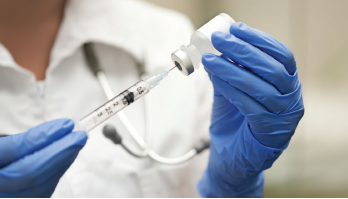
Marlon Lopez MMG1 Design / shutterstock.com
CHICAGO—Rheumatologists often come to Brian Schwartz, MD, associate professor of medicine and vice chief for clinical affairs in the Division of Infectious Diseases, University of California, San Francisco, with a concern: A patient on immunosuppression has a family member who needs a live vaccine, but the patient may be vulnerable to the vaccine’s effects. Should the family member get the vaccine?
The answer is yes, but precautions may be needed, Dr. Schwartz said during a session of the 2019 ACR State-of-the-Art Clinical Symposium, held April 5–7. His review of vaccinations in the context of rheumatic disease frequently touched on this theme: Vaccines are often advisable and safe for rheumatology patients—with caveats.
Family & Vaccines
In the case of a close family member getting a live vaccine, Dr. Schwartz said the benefits are worth it, even though “the person you’re most likely to get an infection from is probably the person you’re living with.”
“What I want to highly recommend—and recommend you to tell your patients—is that everybody in their family should get every vaccine that is recommended for them, because I really think a well-immunized family serves as a barrier to protect your patients from getting sick,” Dr. Schwartz said.
However, if a family member is getting a live influenza vaccine, the immunosuppressed person with rheumatic disease should avoid close contact. The patient should also be careful about contact with an infant who has just received a rotavirus vaccination, Dr. Schwartz said.
Effectiveness

Dr. Schwartz
When a rheumatologist is about to start a patient on treatment, it’s a good idea for patients and their physicians to consider vaccinations and think ahead, possibly holding off on starting a medication to ensure the vaccine can be effective, Dr. Schwartz noted.
“I want you to think about what you’re doing before you’re starting treatment, because that is the time you can get the most bang for your buck with a vaccine,” he said.
A 2017 study looking at flu vaccinations and methotrexate found patients who had methotrexate held for two weeks before the vaccine and for two weeks after, as well as those who had it held for four weeks after the vaccine, had a more robust response to the vaccine than patients who had methotrexate held for four weeks before or who didn’t have it held at all. However, at the last follow-up visit, patients who had methotrexate held during or after the vaccine experienced about triple the amount of flare—about 20%—compared with 7.5% for those who did not have it held.1
Findings such as these leave it up to a clinician’s judgment to determine whether the benefit of the vaccination is worth the heightened risk of flare, Dr. Schwartz said.
Dr. Schwartz also reminded the rheumatologists in the room about the widespread risk of flu. Although patients may say, “I never get the flu,” and think they don’t need the vaccine, the reality is 43 million symptomatic flu cases occurred in the U.S. in the 2017–2018 season, as well as almost a million hospitalizations and about 80,000 deaths. Patients need to know “there’s a good chance [they’re] going to be affected by this,” he said.
Rheumatology patients who get the flu would benefit from treatment with oseltamivir even if symptom onset is longer than two days—an exception to the rule of thumb that treatment is not beneficial after 48 hours.
“You’re still going to reduce the risk of having a bad outcome” in these particularly vulnerable patients, Dr. Schwartz said.
For patients with a family member with flu and with whom they’ve had close contact, a preventive dose of oseltamivir once a day rather than twice a day can be beneficial even if they’ve shown no symptoms.


